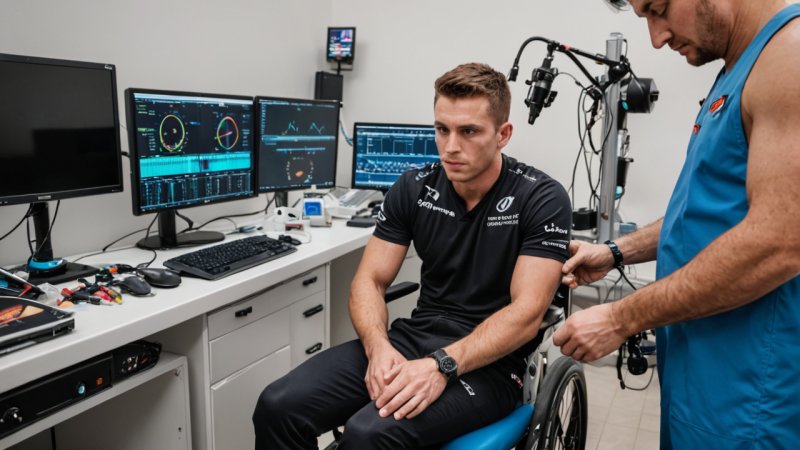Motorsport is an exhilarating blend of speed, precision, and skill, where athletes push their limits to achieve peak performance. However, the physical and mental demands of racing can take a toll on an athlete's health. Regular health check-ups are crucial for motorsport athletes to ensure they remain in optimal condition and can compete at their best. This article delves into the significance of these check-ups, the various aspects they cover, and how they contribute to overall athlete performance and safety.
Understanding the Physical Demands of Motorsport
Motorsport athletes face unique physical challenges that differ from those in traditional sports. The intense G-forces experienced during high-speed turns, the need for precise hand-eye coordination, and the prolonged concentration required during races can lead to various health issues. Additionally, the physical strain of maintaining control over powerful machines can result in injuries and long-term health concerns.
The Toll on the Body
While the thrill of racing may overshadow the risks, it's essential to recognize how the body reacts under extreme conditions. Motorsport athletes often experience:
- Muscle Strain: Repeated acceleration and braking can lead to muscle fatigue and strain, particularly in the neck, shoulders, and arms.
- Cardiovascular Stress: The heart works harder during races due to adrenaline and physical exertion, potentially leading to cardiovascular issues if not monitored.
- Dehydration: High temperatures within the cockpit can lead to dehydration, affecting overall performance and increasing the risk of heat-related illnesses.
- Vision Problems: Long hours of concentration and exposure to bright lights can strain the eyes, leading to fatigue and impaired vision.
Why Regular Health Check-Ups Are Essential
Regular health check-ups serve as a proactive measure to mitigate the risks associated with motorsport. They allow for early detection of potential health issues, ensuring that athletes can remain competitive while prioritizing their well-being.
Early Detection of Injuries
Motorsport athletes are prone to injuries that may not be immediately apparent. Regular check-ups can help identify:
- Musculoskeletal Issues: Regular assessments can catch early signs of stress fractures or muscle imbalances before they develop into serious injuries.
- Cardiovascular Health: Routine checks of heart function can reveal abnormalities that may require intervention.
Psychological Assessments
The mental strain of competing at high levels can lead to stress, anxiety, and burnout. Regular psychological evaluations are essential to:
- Monitor Mental Health: Psychologists can provide strategies for coping with the pressures of competition.
- Enhance Focus: Mental conditioning can improve concentration and performance under pressure.
Components of a Comprehensive Health Check-Up
A thorough health check-up for motorsport athletes typically includes several components:
Physical Examination
A detailed physical examination assesses overall health, including:
- Muscle and Joint Health: Evaluating flexibility, strength, and range of motion.
- Cardiovascular Fitness: Conducting stress tests to measure heart rate and blood pressure under exertion.
- Vision Tests: Checking for any vision impairments that could affect racing performance.
Imaging Studies
Advanced imaging techniques, such as MRI or X-rays, may be employed to:
- Identify Injuries: Detect underlying injuries not visible during a physical examination.
- Track Recovery: Monitor healing progress after an injury.
Blood Tests
Routine blood tests are essential for:
- Assessing Nutritional Deficiencies: Identifying deficiencies in vitamins and minerals that could impact performance.
- Checking Hormonal Levels: Monitoring testosterone and cortisol levels to evaluate stress and recovery.
Integrating Technology in Health Monitoring
With the rise of athletic technology, motorsport athletes can leverage various tools to enhance their health monitoring:
Wearable Devices
Wearable technology, such as heart rate monitors and fitness trackers, can provide real-time data on an athlete's physiological status during training and racing.
Telemedicine
Telehealth services allow athletes to consult with healthcare professionals remotely, ensuring they receive timely advice and care without extensive travel.
Creating a Health Check-Up Schedule
Establishing a regular health check-up regimen is vital for motorsport athletes. Consider the following frequency recommendations:
- Annual Comprehensive Check: A full health assessment once a year is advisable.
- Quarterly Evaluations: More frequent visits focusing on specific areas, such as cardiovascular health or injury management.
- Post-Injury Assessments: Additional visits may be necessary following injuries to ensure proper recovery.
Conclusion
In conclusion, regular health check-ups are indispensable for motorsport athletes seeking to maintain their physical and mental well-being. By proactively addressing health concerns, athletes can enhance their performance and longevity in the sport. A comprehensive health check-up regimen, combined with the latest advancements in technology, can help motorsport athletes navigate the challenges of their sport while prioritizing safety. By focusing on both health and performance, athletes can ensure they are always ready to take on the track.






